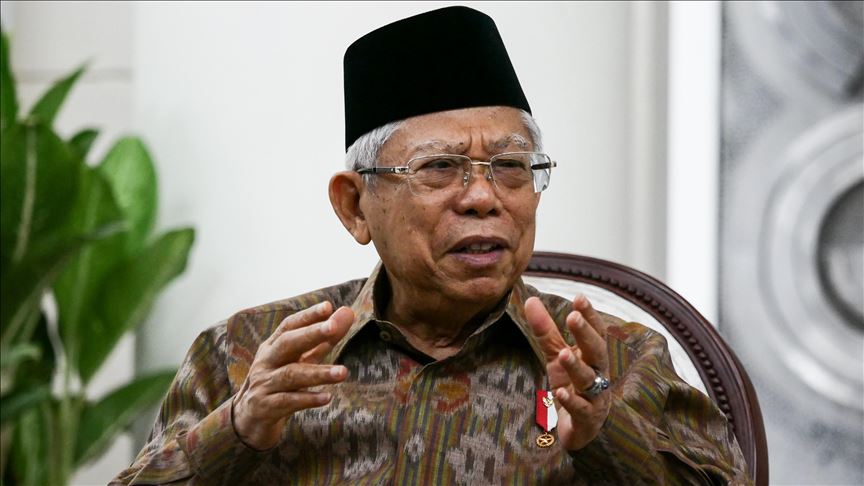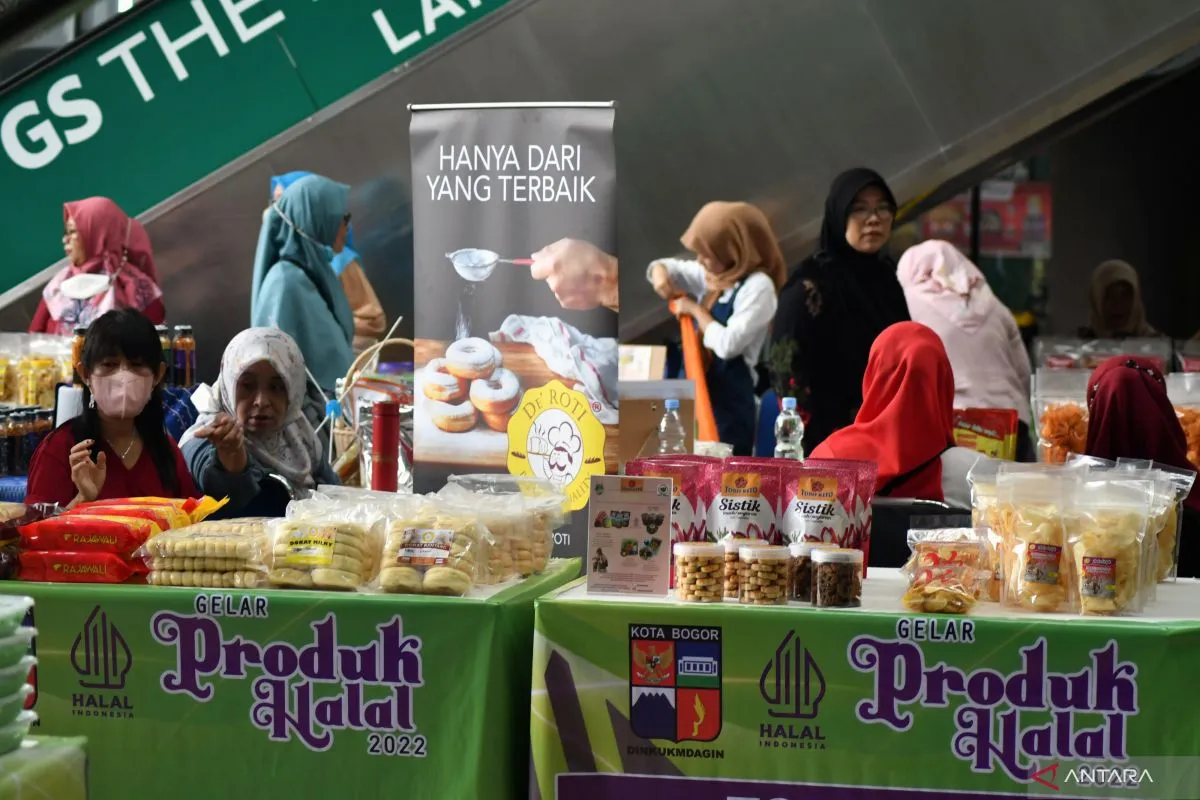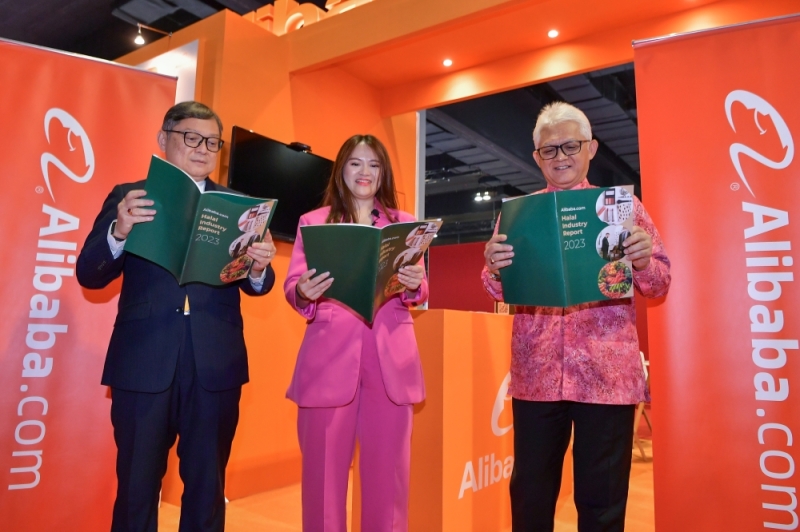Vice President Ma’ruf Amin speaks to Anadolu Agency on a range of topics covering economic and political issues
Dandy Koswaraputra, Pizaro Gozali, and Rhany Chairunissa | Andolu Agency

JAKARTA
While small businesses across the world are hit by high interest rates, Indonesia has offered Sharia-based (Islamic law-based, interest-free) business to small- and medium-sized entrepreneurs, according to a top Indonesian leader.
In an exclusive interview with Anadolu Agency’s Indonesian service in Jakarta, Indonesian Vice President Ma’ruf Amin covered a wide range of topics — domestic, international, and economic — and said that his country plans to pay more attention to halal tourism.
The 76-year-old former leader of the Indonesian Ulema Council said his government is planning to set up an Islamic social fund and expand Islamic finance enterprises across the county.
Anadolu Agency: As vice president, what are your main programs for the next five years? Do you have specific tasks assigned by President Joko Widodo?
Ma’ruf Amin: The president and I share the same visions. There are five visions that we want to achieve, including human resource development, infrastructure development, regulatory simplification, bureaucratic reform, and economic transformation. However, the president already gave specific tasks, particularly about the empowerment of micro, small and medium enterprises, poverty alleviation, Islamic economic development, and combating radicalism.
Q: You are known as an important figure from the Indonesian Ulema Council, the largest Islamic organization in the country. What efforts will you make in achieving peace in the Islamic world?
AMIN: The government considers developing and strengthening the Islamic economy as crucial steps, so they established the National Sharia Finance Committee, which is chaired by the president. As the committee is expanding, the government has to revise the president regulation so it covers not only finance but also Islamic economics.
At least four goals must be achieved within Islamic economic development.
First, the halal [Muslim production code] industry needs to be developed. So far Indonesia only provides halal certification for both domestic and foreign products. According to official data, our country is the largest consumer of halal products, and now we are striving to become a producer as well. Hence, we will encourage our halal industry to be a producer that meets domestic and foreign needs.
Second, we ought to expand the Islamic finance industry, including bank and non-bank financial institutions such as insurance firms, pawnshops, capital markets and sukuk [Sharia/Islamic bonds].
Third, we also want to increase Islamic social funds in the form of/through zakat and waqf because we believe it has huge potential. Currently, we only managed to collect 3.5% of zakat funds which amounted to 8 trillion Indonesian rupiah [$571.8 million]. Meanwhile, waqf also has great potential, as it is able to boost investment in the country.
Last but not least, we will encourage the growth of Sharia business, especially small- and medium-sized enterprises. The rapidly growing SMEs make up around 98% of all business entities and employ more than 75% of the total workforce in our country. However, we must improve both quantity and quality. This is our main concern right now.
Q: As vice president, can you explain the government’s efforts for people empowerment?
AMIN: We will continue to encourage economic empowerment by expanding small- and medium-sized enterprises (SMEs). So far, we have coordinated and synergized with related institutions and ministries to strengthen these efforts.
We need to involve large groups of entrepreneurs and state-owned enterprises (SOEs) so they do not set foot in this sector or handle the small business. Large entrepreneurs and state-owned enterprises must collaborate with small entrepreneurs to make them grow.
We cannot let the growth of SMEs be hampered. Besides, we also encourage e-commerce groups to expand SMEs’ products domestically and abroad and provide guidance so they will be able to produce market-friendly products.
Q: Indonesia will once again host a trilateral meeting with Afghan and Pakistani clerics next year. What are the goals of the meeting?
AMIN: We will encourage the Bogor Ulema Declaration for Peace so that it will not only be a unifying agreement but can be fully implemented. Therefore, we will encourage the achievement of a “meeting point” between the differences.
We also aim for a national agreement or “ittifaq wathaniyah” using our methods as the model. Indonesia is more pluralist than Afghanistan. We have six recognized religions and more than 700 tribes or ethnic groups.
However, we are able to unite as a country because we have a meeting point, which is Pancasila [foundational philosophical theory of Indonesia] and the agreements that have been summarized in the Constitution. Therefore, we want to bring Afghanistan to peace with similar approaches.
Q: Turkish President Recep Tayyip Erdogan is scheduled to visit Indonesia next year. What do you think about potential cooperation between the two countries?
AMIN: Turkey is our strategic partner and we continue to build and develop ties, especially in trade and culture. Indonesia sends a lot of students to study in Turkey every year, and there are many Turkish schools established here. We are members of the G20 and also fellow moderate Muslim countries.
Only a few countries with a majority of moderate Muslims can overcome the clash between Islamic and nationalistic values. We have the desire to advance the economy of the people, to revive it, and to not let it go down. We also want to maintain world peace.
Therefore, Indonesia develops the principle of “ukhuwah Islamiyah” [Islamic brotherhood]. Here, the principle of Islamic brotherhood has been widely applied, but in the region, it has not been well implemented. We also try to build “ukhuwah insaniyah” [humanitarian brotherhood]. There are still many conflicts here and there.
For this reason, together with Turkey, Indonesia aims to strengthen these principles so that we can become mediators to build peace. Currently, a lot of conflicts have been dealt with in political and military ways, but they have not yet been resolved.
So we attempt to use religious and civilization approaches to resolve conflicts. As a partner, Indonesia would like to invite Turkey, together with other world leaders, to work together to carry out these approaches to resolve ongoing conflicts.
Q: The Kuala Lumpur Summit will be held on Dec. 18-21. Some 450 leaders and thinkers from the Muslim world will attend the event, including from Indonesia and Turkey. Do you think there will be a new Muslim body established? What do you think about the summit?
AMIN: It seems that the KL Summit will not yet form an institution like the Organization of Islamic Cooperation (OIC), but I think we need to align our perception that we are facing several problems.
Some Islamic countries are still economically weak. Therefore, we must think about how to build the economic power of Islamic countries.
Islamic countries have also lost their cultural prestige. In the past, Islamic states were known as cultural centers, but nowadays, we seem to have lost our political and cultural power.
Islamic countries still face conflicts, internally or between each other. That happened because of the weakening of unity, integrity and cooperation between the countries.
We can’t conclude whether the KL Summit will strengthen the OIC or form a new body that provides new values to strengthen and empower Islamic countries.
Q: Indonesia has a very important role in the Association of Southeast Asian Nations [ASEAN], but we often get criticized for not taking concrete steps, especially in dealing with the Rohingya issue. What do you think about this?
AMIN: I believe Indonesia has taken a leading role, especially in the framework for repatriation and assisting the Rohingya in dealing with their problems. Indonesia has built schools and hospitals in [Myanmar’s] conflict-weary Rakhine state.
We are determined to become more involved in social and political roles. Our president, Joko Widodo, along with former Vice President Jusuf Kalla, has visited Rakhine. We also urged the United Nations to get involved more in these efforts.
Q: The volume of trade between Indonesia and Turkey falls short of the desired level. What do you think the government can do to manage this issue?
AMIN: Like I said earlier, Turkey is our strategic partner. We will continue to renew trade agreements so that they can be mutually beneficial and help one another. We will continue to improve the agreements.
In principle, we want to advance our trade relations together. We will keep exploring our export and imports according to our needs. In this way, [a balanced] strategic trade partnership will be formed.
Q: Anadolu Agency’s Indonesian service has been established for more than two years. How do you see its role as a Turkish news agency operating in Indonesia?
AMIN: There are a lot of positive things about the presence of Anadolu Agency in Indonesia. The agency reports on developments in Indonesia and vice versa also reports on advancements in Turkey. The agency also delivers various [types of] information to build closer and more positive cooperation for the advancement of people in both countries.
The news published [by Anadolu Agency] will be able to encourage the two countries to learn from each other. As there are many Turkish [university] alumni here, the information will also help to pursue developments.



